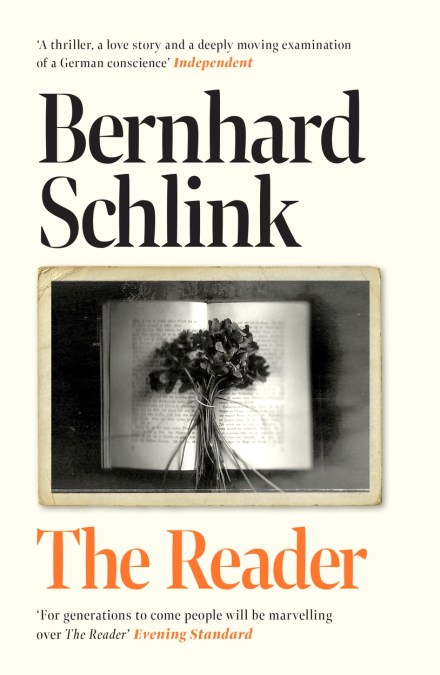The Reader
On sale
13th November 2025
Price: £10.99
The 30th anniversary edition of the classic international bestseller, with a new afterword from Bernhard Schlink
‘A masterly work. Read this and read it again’ – Observer
‘A thriller, a love story and a deeply moving examination of German conscience’ – Independent
‘Examines the nature of understanding and tests the limits of forgiveness’ – Times
For 15-year-old Michael Berg, a chance meeting with an older woman leads to far more than he ever imagined. The woman in question is Hanna, and before long they embark on a passionate, clandestine love affair which leaves Michael both euphoric and confused. For Hanna is not all she seems.
Years later, as a law student observing a trial in Germany, Michael is shocked to realise that the person in the dock is Hanna. The woman he had loved is a criminal. Much about her behaviour during the trial does not make sense. But then suddenly, and terribly, it does – Hanna is not only obliged to answer for a horrible crime, she is also desperately concealing an even deeper secret.
The Reader is an international bestseller and a true modern classic, the essential Holocaust novel, examining the gap between Germany’s pre- and post-war generations, between the guilty and the innocent, and between words and silence.
‘For generations to come people will be marvelling over The Reader’ – Evening Standard
‘A masterly work. Read this and read it again’ – Observer
‘A thriller, a love story and a deeply moving examination of German conscience’ – Independent
‘Examines the nature of understanding and tests the limits of forgiveness’ – Times
For 15-year-old Michael Berg, a chance meeting with an older woman leads to far more than he ever imagined. The woman in question is Hanna, and before long they embark on a passionate, clandestine love affair which leaves Michael both euphoric and confused. For Hanna is not all she seems.
Years later, as a law student observing a trial in Germany, Michael is shocked to realise that the person in the dock is Hanna. The woman he had loved is a criminal. Much about her behaviour during the trial does not make sense. But then suddenly, and terribly, it does – Hanna is not only obliged to answer for a horrible crime, she is also desperately concealing an even deeper secret.
The Reader is an international bestseller and a true modern classic, the essential Holocaust novel, examining the gap between Germany’s pre- and post-war generations, between the guilty and the innocent, and between words and silence.
‘For generations to come people will be marvelling over The Reader’ – Evening Standard
Reviews
Leaps national boundaries and speaks straight to the heart . . . a moving, suggestive and ultimately hopeful work
For generations to come, people will be reading and marvelling over Bernhard Schlink's The Reader
Haunting and unforgettable
Deeply moving, sensitive enough to make me wince, a Holocaust novel, but light years away from the common run
The Reader by Bernhard Schlink is the German novel I have been waiting for: it objectifies the Holocaust and legitimately makes all mankind responsible
[Schlink] explores the conflict between generations, wrestling with collective guilt and individual motivation. He examines the nature if understanding and tests the limits of forgiveness. He does these things with honesty, restraint and a moral precision both unsettling and rare. The result is as compelling as any thriller
Schlink's extraordinary novel The Reader is a compelling meditation on the connections between Germany's past and its present, dramatised with extreme emotional intelligence as the story of a relationship between the narrator and an older woman. It has won deserved praise across Europe for the tact and power with which it handles its material, both erotic and philosophical

